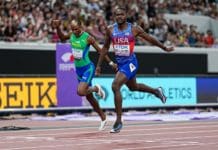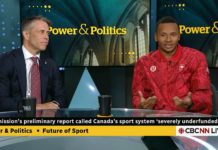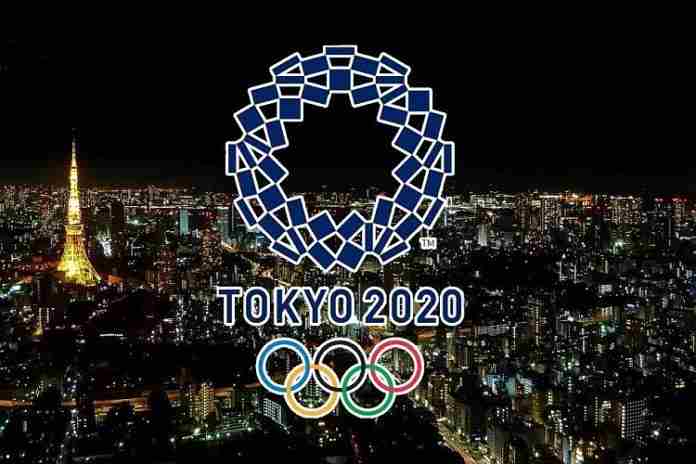With the postponement of the Tokyo Games to 2021 now confirmed, the enormous task of re-organizing the event for one year later is now underway in Tokyo, as well as around the world as staff members of International Olympic Committee work from home during the coronavirus pandemic.
This was explored in a rare teleconference that featured four of the IOC’s staff directors and not President Thomas Bach (GER). Instead, the speakers included Executive Director of the Olympic Games Christophe Dubi (SUI), Sports Director Kit McConnell (AUS), National Olympic Committee Relations and Olympic Solidarity Director James Macleod (GBR), and Timo Lumme (FIN), the Managing Director of the IOC Television and Marketing Services. About 200 news media telephoned in live and more grabbed the audio recording here.
The short summary: the athlete experience is expected to be the same – more or less – in a year’s time. Everything else is up for review.
Dubi articulated this well in his opening remarks:
“One has to understand that Tokyo 2020 and the authorities were really close to delivery. When we speak [of] four months out, this is a machine that is ready to deliver. It has been trained, they have their volunteers identified, everybody is ready to go …
“And it’s a machine that was built on fundamentals built at the time of the candidature; this is seven years ago, where you have an Olympic Village that was contracted at the time, built and ready to operate. You have 41 sport venues, sport being the very core of everything: 41 venues that had very detailed contracts. Convention centers that would be hosting some of the competitions, but also media centers, such as the Tokyo Big Sight. Forty thousand hotel rooms that were booked by the organizing committee, plus many thousands of others booked internationally by agencies to host the world. Two thousand buses, logistics spaces, thousands of contracts for good and services, and all this towards a date, which was this summer.
“And all of this now has to be re-secured, one year later. So, it’s a massive undertaking to get to the fundamentals and make sure that, in a matter of weeks, we have secured all of this so that then, you have a task which is to plan for the remainder of the 16 months to go, [which] can be done with some certainty regarding these fundamental pieces that needs to be in place.”
There were lots of questions about the financial impact of the postponement on athletes, on National Olympic Committees and the International Federations. As regards athletes, especially those receiving IOC support through the Olympic Solidarity program, Macleod explained:
“We’re under no illusions; this [crisis] will have an impact in the future. NOCs are already looking at how they are going to be working and operating in the future. But some of the things we have managed to do immediately is to re-assure them that some of the key programs that are preparing for the Olympic Games – so you may have seen yesterday – we confirmed already Olympic Solidarity scholarships for athletes who are preparing for the Tokyo Games, and the refugee athletes program. And these are very important programs for NOCs just to have that assurance that their athletes will continue to get support in the lead-up to the Games.
“We’ve got over 1,600 scholarship holders from 185 NOCs that are currently benefitting now, and the feedback that we got from the NOCs on just that one move – which was important for us to make right quickly – allows them really to look forward in a positive way and say that the teams that they’ll be sending to the Games will still get that support.”
McConnell addressed the IF question … very carefully:
“We’re very conscious of the impact of the coronavirus across the world of sport, and sport not operating in isolation of wider society. We know the federations have lost a number of events this season and the revenues not only from this season, but potentially the next calendar year will be impacted as well. … And it is not only the IFs obviously, it’s the national federations, their event operators and everyone else. …
“I think it’s too early for us to speculate in terms of what the situation will be coming out of it and what the IOC’s role with the federations will be. But I think we again would acknowledge the challenge a lot of them will have, are having and the fact that they are assessing that themselves at the moment, and we will continue to discuss that with them, to assess it and see what role we can play with them in addressing that.”
Asked about what arrangements are being made with broadcasters in terms of payment of rights fees, Lumme also said that discussions had been started, but that’s all.
Dubi indicated that the costs involved, and the new timeframe of the Games, will provide both the opportunity and the requirement to review almost – but not quite – everything once again:
“Sport remains front and center of everything we do and there we can guarantee that it’s going to be the same great delivery when it comes to the core, and the athletes at the very center as well, where nothing will be touched here, so they can maximize, and we can all witness, their performances.
“Now, when it comes to all of us, and I mean the media organization, the IOC and everyone that has an operation in Tokyo, we are facing a different landscape. All of us, we have to look at whether we are going to do exactly the same in a year from now, or whether we will have to adjust.
“I’m not revealing any secrets here: we were with some of the big media organizations earlier in the day and asked exactly that question. How do you see the Games in a year for you? Will you have exactly the same operation or not? Should we change some of the baseline assumptions in order to plan for these Games one year later according to what will be needed at that time?
“So it’s a combined effort from everyone to look at what will be needed, what we have to adjust and address and this work has started with Tokyo 2020 as well, because a number of things, they can look at maybe slightly differently. Can we review some of the logistics spaces that we had? Can we optimize some of these spaces? Where can we find different solutions in order to reduce the pressure? And the one thing we have delivered as a message to everyone in our different conversations and dialogue with stakeholders is ‘let’s make sure we all do the right thing in trying to be creative, innovative; we have time ahead of us to further help Tokyo’; although we have this incredible commitment from the government, at the highest level, we still have to do this work to assist and make sure we do the right thing. So we’re looking at the entire piece and see where we can gain efficiencies.”
Taking Dubi at his word, this is another indicator of the maturation of the IOC into the 21st Century. In a prior time, a postponement of the Games would have been unheard of, and a delay of a year would have been an opportunity to pour on the pressure for more bells and whistles, all at the expense of the organizing committee.
But Dubi and his fellow directors – especially McConnell and Macleod – will be pressed hard by IFs and NOCs to advance some of their “Tokyo 2020″ money before the Games take place in 2021, in order to stay afloat. How the IOC handles this will shape its place in international sport well into this decade.
Having already reformed the financial environment in which Olympic Games are organized, the IOC now has an opportunity in front of it to cool some of the criticism it always receives about how well its members are treated during the Games. Buses instead of private cars, more modest hospitality and more recognition for the organizing committee, the Tokyo Metropolitan Government, the Japanese national government and the enormous volunteer corps set to support the Games can go a long way.
(Flashback: One of the surprise gestures of the 1984 Games in Los Angeles was the distribution of a special pin to all of the LAOOC staff at the end of the Games, featuring the word “Gracias” above the initials J.A.S., from IOC President Juan Antonio Samaranch. A small thing, but still a prized possession in many personal collections of Games memorabilia.)
McConnell also explained the qualification program, noting that while about 57% of all of the Games entries had been assigned, that did not mean that a specific athlete had been identified. For example, the U.S. men’s basketball team has qualified for the Tokyo tournament, but the specific players have yet to be selected. But for those who have qualified personally, like marathoners Galen Rupp and Aliphine Tuliamuk of the U.S., their spots are safe, as long as endorsed by the U.S. Olympic and Paralympic Committee.
McConnell also noted that discussions are ongoing with several international federations over athletes who are subject to age limits, such as the under-23 requirement for men’s football. He expected those discussions to be concluded in the next couple of weeks. McConnell also confirmed that, at least for now, the competition schedule will remain the same, including the marathons and race walks in Sapporo.
This teleconference was a great idea by the IOC, showing that it is more than simply Thomas Bach. Spokesman Mark Adams (GBR) promised more sessions in the future, which can help to humanize the IOC to an extent rarely seen in its century-plus history.
What of Tokyo? There are a lot of details to chase after, but if the organizers can hold on to the 41 competition venues and the major support sites, much of the work already completed can be re-confirmed in a few months. But to do that, the coronavirus crisis must pass, and neither the IOC or the Japanese can say when they will be.
Rich Perelman
Editor
You can receive our exclusive TSX Report by e-mail by clicking here. You can also refer a friend by clicking here.























